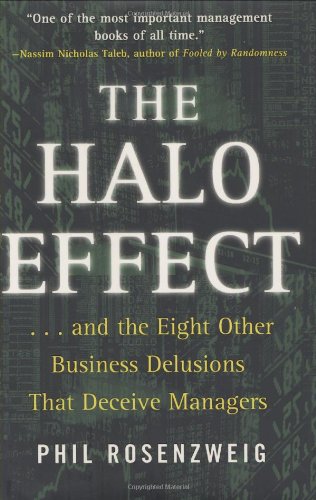Why do some companies prosper while others fail? Despite great amounts of research, many of the studies that claim to pin down the secret of success are based in pseudoscience. The Halo Effect is the outcome of that pseudoscience, a myth that Philip Rosenzweig masterfully debunks in THE HALO EFFECT. The Halo Effect describes the tendency of experts to point to the high financial performance of a successful company and then spread its golden glow to all of the company's attributes - clear strategy, strong values, and brilliant leadership. But in fact, as Rosenzweig clearly illustrates, the experts are not just wrong, but deluded. In this irreverent and witty book, the author shows readers how to truly understand business performance. Readers will learn about the Delusion of Single Explanations, the Delusion of Absolute Performance, the Delusion of the Wrong End of the Stick, and other fantasies lovingly held by managers that ultimately destroy business success. Rosenzweig also suggests a more accurate way to think about leading a company, a robust and clearheaded approach that can save any business from ultimate failure.
Much of our business thinking is shaped by delusions -- errors
of logic and flawed judgments that distort our understanding of the real
reasons for a company's performance. In a brilliant and unconventional
book, Phil Rosenzweig unmasks the delusions that are commonly found in the
corporate world. These delusions affect the business press and academic
research, as well as many bestselling books that promise to reveal the
secrets of success or the path to greatness. Such books claim to be based
on rigorous thinking, but operate mainly at the level of storytelling. They
provide comfort and inspiration, but deceive managers about the true nature
of business success.
The most pervasive delusion is the Halo Effect. When a company's sales and
profits are up, people often conclude that it has a brilliant strategy, a
visionary leader, capable employees, and a superb corporate culture. When
performance falters, they conclude that the strategy was wrong, the leader
became arrogant, the people were complacent, and the culture was stagnant.
In fact, little may have changed -- company performance creates a Halo that
shapes the way we perceive strategy, leadership, people, culture, and more.
Drawing on examples from leading companies including Cisco Systems, IBM,
Nokia, and ABB, Rosenzweig shows how the Halo Effect is widespread,
undermining the usefulness of business bestsellers from In Search of
Excellence to Built to Last and Good to Great.
Rosenzweig identifies nine popular business delusions. Among them:
The Delusion of Absolute Performance: Company performance is relative to
competition, not absolute, which is why following a formula can never
guarantee results. Success comes from doing things better than rivals,
which means that managers have to take risks.
The Delusion of Rigorous Research: Many bestselling authors praise
themselves for the vast amount of data they have gathered, but forget that
if the data aren't valid, it doesn't matter how much was gathered or how
sophisticated the research methods appear to be. They trick the reader by
substituting sizzle for substance.
The Delusion of Single Explanations: Many studies show that a particular
factor, such as corporate culture or social responsibility or customer
focus, leads to improved performance. But since many of these factors are
highly correlated, the effect of each one is usually less than suggested.
In what promises to be a landmark book, The Halo Effect replaces mistaken
thinking with a sharper understanding of what drives business success and
failure. The Halo Effect is a guide for the thinking manager, a way to
detect errors in business research and to reach a clearer understanding of
what drives business success and failure.
Skeptical, brilliant, iconoclastic, and mercifully free of business jargon,
Rosenzweig's book is nevertheless dead serious, making his arguments about
important issues in an unsparing and direct way that will appeal to a broad
business audience. For managers who want to separate fact from fiction in
the world of business, The Halo Effect is essential reading -- witty, often
funny, and sharply argued, it's an antidote to so much of the conventional
thinking that clutters business bookshelves.
